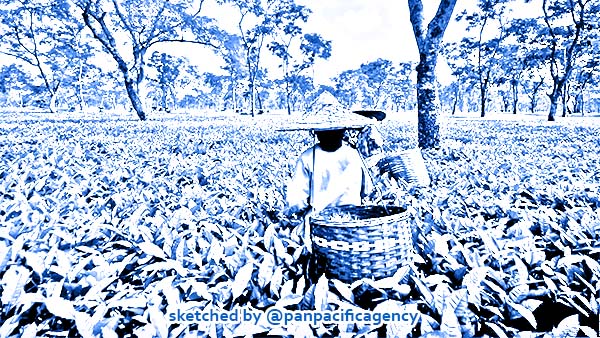Production shortfall not alarming to warrant duty-free import of tea in India

Workers at the tea plantation, India. Photo: travelandleasureindia.in. Sketched by the Pan Pacific Agency.
NEW DELHI, Aug 12, 2020, Hindu BL. All-India tea production during the first half of 2020 (January to June) has slipped by 26.37 per cent to 348.26 million kg, compared 472.96 mn kg in the corresponding period of the previous year, The Hindu Business Line reported.
While the fall appears steep, industry sources contend that the situation is “not alarming” to warrant import of tea at this juncture. “We still have another six months and this drop can be easily recouped,” the source said.
Tea Board statistics show that tea production in North India had fallen by almost 33 per cent between January and June 2020 to 249.83 mn kg (372.48 mn kg), compared to the 2 per cent drop in South India’s production to 98.43 mn kg (100.48 mn kg).
Industry insiders attribute it to the closure of gardens due to the Covid-19-led lockdown, and estimate the average shortfall at not more than 9 per cent.
While a balance sheet on tea was not readily available, considering that India has been a surplus tea producing nation, and that production has only climbed year-after-year in the last five years, the drastic drop in production during the first half of the current calendar year, sources say “has not been due to factors beyond our control”.
In hindsight, the production shortfall has been a blessing for the small tea grower community in South India, as they are able to get a reasonably good price for the green leaf.
Meanwhile, tea exports took a hit during the first five months (up to May 2020) falling by 26.61 per cent to 74.40 mn kg (101.38 m kg).
Industry sources state that the production shortfall has been set off by the drop in export volumes, and therefore, adequate quantities would be available for domestic consumption
While only provisional consumption data is available, the trend indicates a gradual increase with every passing year. “Our per capita consumption of tea is still way below some of the tea exporting countries,” the source said.
Does the situation warrant duty-free import of tea to tide over the shortfall? “Certainly not” say industry stakeholders, although a section of tea packeteers and traders seem to be voicing the need for a “one-time import”.
The apex body of planters in the South — United Planters’ Association of Southern India (UPASI) — has objected to the move to tinker with the import duty structure for tea, stating that it would be counter-productive.
An industry stakeholder told BusinessLine that importing teas for re-export would be justifiable, but considering to bring cheaper teas into the country is “objectionable”, as it would be at the cost of the grower community.
There is a free-flow of appeal and counter-appeal — for and against import of tea — as industry watchers stress the need for protecting the domestic tea industry.